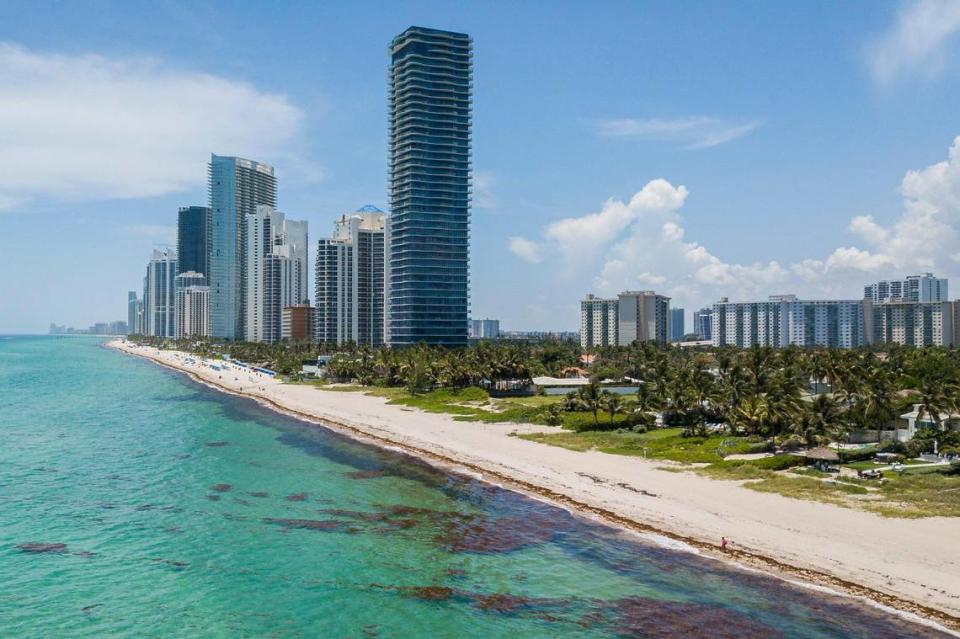Golden Beach, ‘a town like no other,’ has a beach like no other, and outsiders are not welcome
Monica Correa enjoys sunning and swimming at a heavenly spot along Sunny Isles Beach. The beach is at the core of her love affair with South Florida.
But just a few yards north of Correa’s favorite seaside place is an invisible line in the sand. She’s learned she cannot cross that line. Beyond it is the forbidden territory of Golden Beach, which describes itself as “a town like no other.”
“We call it No-No Beach,” Correa said. “There’s a wall you can’t see. You can’t touch that sand. It is for rich people only, and they don’t want to have to look at people like us. If you do go over there, you’ll get into an argument with the cops and it will ruin your day.”
Golden Beach, a tiny, affluent municipality set between the ocean and the Intracoastal Waterway with 919 residents, 364 single-family homes and no high-rises or commercial businesses, is proud to be “nestled in exclusivity and privacy.” It has a history of attracting the rich and famous -- Ricky Martin, Tommy Hilfiger, “TED Talks” creator Richard Wurman, and Eric Clapton, who named his album “461 Ocean Drive” after his vacation home -- and has long asserted domain over its “beautiful mile and one-eighth of private beach,” says its website.
Large signs with WARNING printed in red letters planted at both ends of the beach list rules for outsiders: “You are entering a Restricted Area. Please be aware that Residents’ Private Property extends approximately to the water’s edge. Anyone wishing to traverse this beach must do so along the tide’s edge. Recreation and loitering is strictly prohibited and is considered trespassing. Violators are subject to arrest under Florida State Statute 810.09.”
People who live in neighboring Sunny Isles Beach to the south and Hallandale Beach to the north -- cities with welcoming signs on their public beaches -- complain that Golden Beach has used the coronavirus pandemic to reinforce its beach exclusivity. Visitors -- who were temporarily prohibited from entering the town through its gatehouse in April -- increase the risk of spreading the virus, so that’s another reason to keep them away. Since pandemic restrictions were lifted and beaches reopened throughout South Florida last month, attendants posted at both ends of Golden Beach tell beachgoers it’s a private beach closed to non-residents.
Is it private? And if so, how much of it? There’s the rub between oceanfront homeowners in “a town like no other” and the beach-loving public that sees a gorgeous stretch of empty, taboo sand.
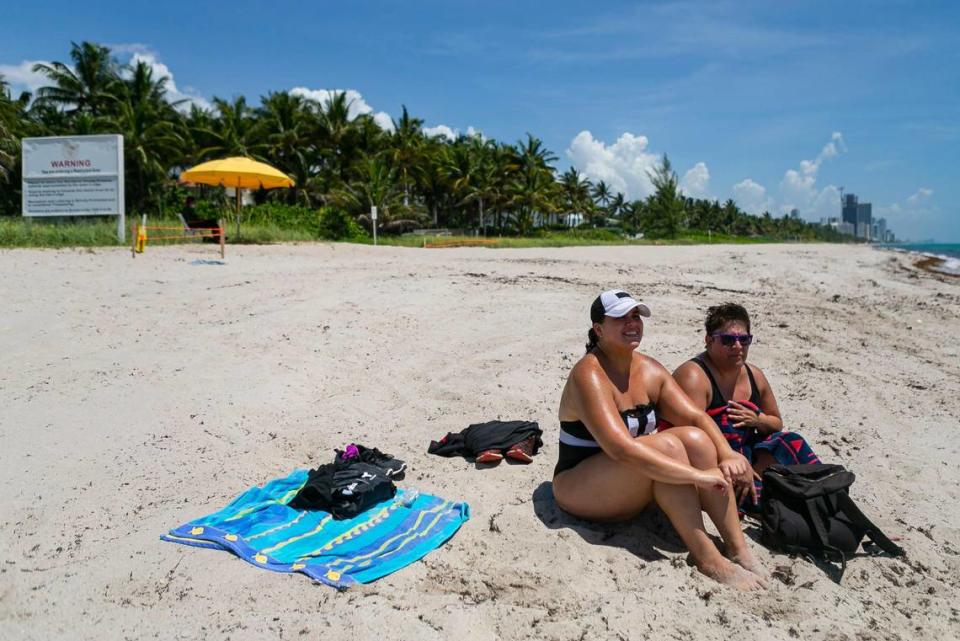
“I don’t like bullies, and I especially don’t like rich bullies,” said Mike Rudd, who lives on the south border of Golden Beach, in a Sunny Isles Beach condo building. “Why isn’t anybody on that beach, the prettiest one for miles? It’s because the public is second to the desires of a few wealthy people. It’s because the sign and the attendant and the police intimidate anyone who would like access.”
The admonishing tone of the message from Golden Beach is what offends Peter Ehrlich, Miami businessman, community activist and a founder of Scenic Miami.
“The content of the signs, plus the obvious and intimidating presence of public sector employees, definitely prevents me from taking a step on the public beach in Golden Beach,” he said. “I do not want to get accosted or even worse arrested.
“All public beaches in Florida should welcome the public, not scare the public away.”
Under Florida law, privately owned beach property can extend to a point known as the mean high-water line. It’s a line that fluctuates with the tides, erosion and sea rise. On public beaches or in parks, the swath of sand between the high-water line and the ocean is open to all. But in Golden Beach, founded in 1929, beachfront homeowners have steadfastly protected the land they claim under state law.
“It’s always along beaches where these disputes happen because people assume all Florida beaches are entirely public,” said Town Attorney Stephen Helfman. “But the beach may not be what you perceive it to be. It’s a little difficult to understand because it’s an imaginary, legal line. Golden Beach has always been a purely private beach and use of the dry sand has always been limited to property owners. The public can use the wet sand but of course it’s not very comfortable to sit there.”
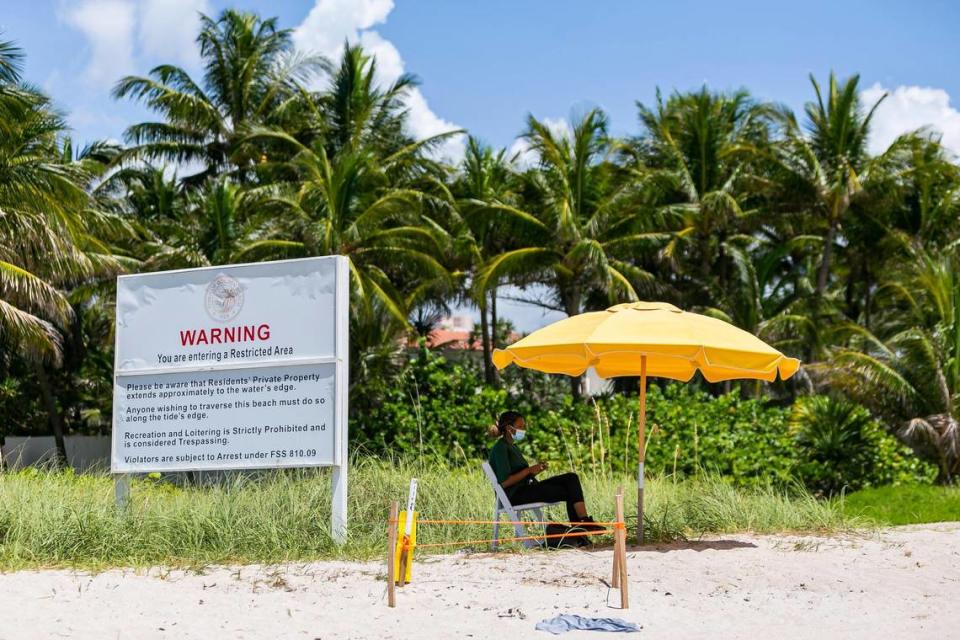
The town commissioned a survey of the mean high water line in 2017. The map shows the town’s six dozen oceanfront parcels, with the deepest extending 433 feet to the high water line and the shallowest extending 313 feet.
The survey contrasts with the Miami-Dade County property appraiser’s aerial photos and legal descriptions of the lot sizes. The ocean-side, backyard property lines of the estates do not extend anywhere near the high water line or water’s edge. The parcels are mostly boxed off where the vegetation ends and the sand starts. Widths range from 50 to 250 feet. Depths range from 332 feet to 230 feet.
While an appraiser’s office spokesperson said property demarcations are “extremely accurate,” Helfman said those county boundaries delineate tracts for assessment purposes.
“You have a deed that doesn’t go all the way down to the high water line, but by state law you own down to the high water line, which could be outside of that tract,” he said.
Golden Beach homeowners’ situation is different from that of homeowners in Altos Del Mar, the only single-family home community located directly on the ocean in Miami Beach. Altos Del Mar granted an easement for public use of the beach, Golden Beach Town Manager Alex Diaz said.
“People may feel that Golden Beach homeowners are privileged and entitled, but they are vested under Florida statutes to the exclusive right of enjoyment of the land down to the high water line,” Diaz said. “These lots were designed and deeded in the 1920s with no public access to the beach. When you buy a $25 million property and pay $500,000 in taxes you don’t want people disturbing your right to enjoy your property.
“People are frustrated as their own areas become more developed and populated and they think, ‘That’s not fair, there’s nobody over there.’”
Town officials say a handful of persistent homeowners acting as unofficial watchmen call town police whenever they observe a stranger on the beach. Police officers patrolling on ATVs respond to those complaints and ask non-residents to mosey along on the water’s edge.
“It really only becomes an issue when residents ask the town to enforce the trespassing law,” Helfman said. “Golden Beach does not own that land. But our residents do, and we have to act on their behalf.”
Said Diaz: “In fairness to the city and staff, there are homeowners who call on a daily basis. They say their rights are being infringed upon and we do respond.”
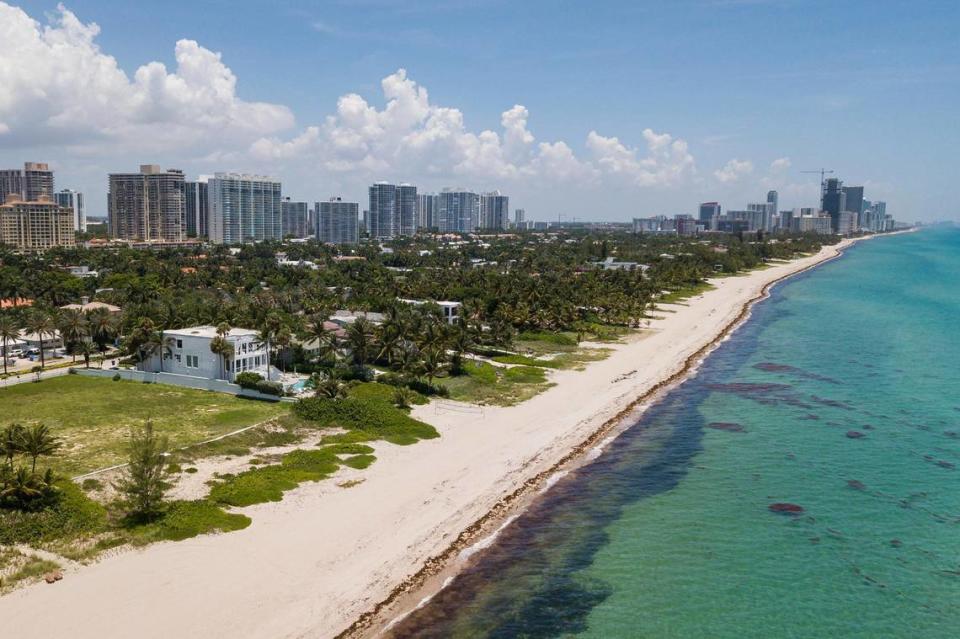
The police have not issued a ticket or arrested anyone in his 13 years on the job, Diaz said.
“I’ve never heard a resident say, ‘I don’t like these people’ in a derogatory way,” said Diaz, who added that the beach attendants are “beach ambassadors” employed by Miami-Dade County to enforce social-distancing rules. “I’ve heard more complaints about fishermen leaving lures and hooks behind than about someone playing loud music on the beach.”
Rudd, who likes to walk on the beach, said he’s never been hassled by Golden Beach police but that’s because they are familiar with him. He said the attendants don’t have any distancing to enforce on the mostly empty beach, but he has observed them telling people who cross the line that the beach is private.
“Most people will be deterred by any police presence and they are not going to argue with a policeman about the town’s ridiculous rules,” he said.
Correa, who lives in Aventura, said she has seen unpleasant exchanges between police and beachgoers, including the time a homeowner came out of her house to shoo away a kitesurfer. The police were called and the kitesurfer challenged them to arrest him before they persuaded him to move south of the town line.
“During busy times or tourist season, the cops are going up and down the beach on their ATVs,” Correa said. “Sometimes we’ll see people who don’t know go over there and put their towels down and sure enough, 10 minutes later the cops show up and tell them to leave.”
Myriam Sandler, her two daughters and her mother recently sat down on Golden Beach when the attendant was not on duty. They live nearby in Sunny Isles Beach and haven’t had a problem when they cross the line into Golden Beach.
“We come to this side because there’s always fewer people here,” Sandler said.
Golden Beach resident Ana Pita lives on the beach. She doesn’t object to visitors and has never complained.
“Anybody can use the beach if they respect the properties,” she said. “As far as I know, the property line is set far back from the water. I don’t know why a homeowner would want to say the whole beach is private. Maybe because the people who live here believe they are paying a lot of money for their privacy. They want to keep it exclusive.”
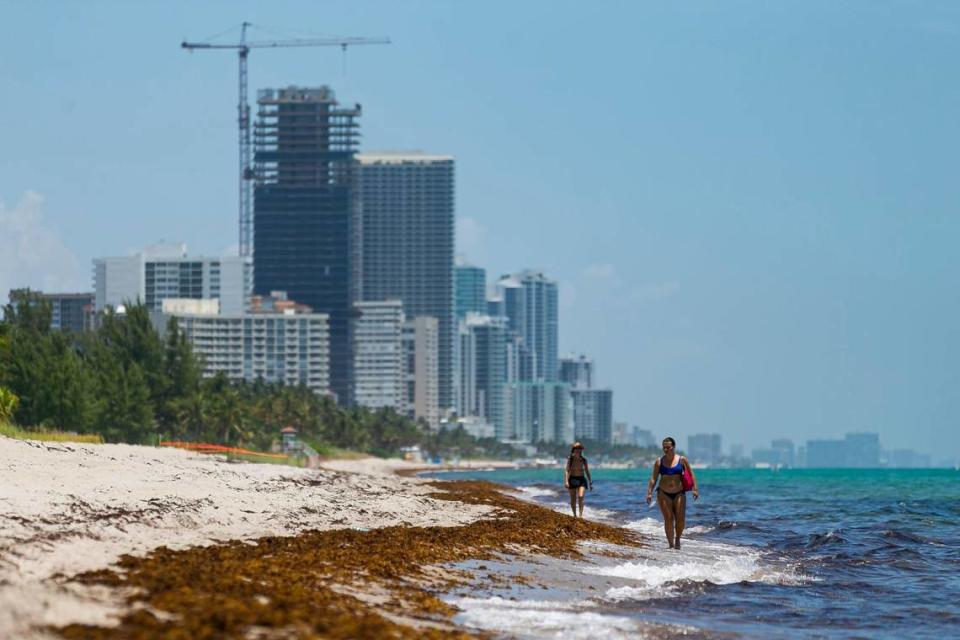
The debate over beach property rights has gotten ugly in Walton County, in the Florida Panhandle. Property owners, including former Arkansas governor and two-time presidential candidate Mike Huckabee, who built a $6 million beachfront house, persuaded a judge to allow them to annex the land from their backyards to the mean high water line along the Gulf of Mexico. They put up signs, fences, ropes and surveillance cameras, hired security guards and called the police in an effort to banish the millions of locals and tourists who have enjoyed the sugar sand beaches for generations.
Walton County is suing for the public’s right to “customary use” of its 26 miles of beach, as defined by the Florida Supreme Court in 1974 in a Daytona Beach case: “No part of Florida is more exclusively hers, nor more properly utilized by her people than her beaches. There is probably no custom more universal, more natural or more ancient, on the sea-coasts, not only of the United States, but of the world, than that of bathing in the salt waters of the ocean and the enjoyment of the wholesome recreation incident thereto.”
Huckabee and his neighbors are fighting back. He has said they have been “demonized as ‘greedy, selfish and rich’ owners who want to deprive the poor of their rights,” but that he’s been deprived of his. “I’ve found used condoms on my walk-down, glass bottles broken, dog feces, litter. Sharp tent poles that can cut bare feet and worse. Large tents with large groups with boom boxes make using my own property very difficult during high season.” He has said there are plenty of public beaches and “most beachfront owners don’t run people off their property, anyway. I haven’t, and despite the lies told, I’ve not placed signs prohibiting people from responsible use of my property.”
Miami native, Santa Rosa lawyer and beach access advocate Daniel Uhlfelder said similar battles are unfolding in coastal California, Texas, North Carolina and New England.
“Waterfront property owners are using any means necessary to exclude the public from beaches,” he said. “These beaches have been used by the people since time immemorial, and anybody who bought and developed these properties knew they had historical use as a beach.
“Beaches are part of our DNA as Floridians. So all of a sudden, I go sit down on my neighborhood beach and a sheriff’s deputy tells me I’m trespassing? A private yard does not back up to the Gulf of Mexico or the Atlantic Ocean. It’s a greedy, immoral land grab -- and it’s going to backfire on Florida’s economy because tourists won’t want to come here anymore.”
Uhlfelder said Walton County’s “customary use” argument could apply to Golden Beach, especially if Miami-Dade County or the state decided to challenge the town.
Town attorney Helfman disagrees. While Golden Beach may be bookended by public beaches, what the website refers to as the “talented, discerning residents” of “this idyllic town” have never allowed outsiders on their beach.
“As long as Golden Beach has existed, residents have made sure the public did not acquire customary use, and customary use is particular to a place,” he said. “Golden Beach property owners have made strong and intentional efforts to protect and preserve the dry-sand beach as private so no one can claim customary use.”
